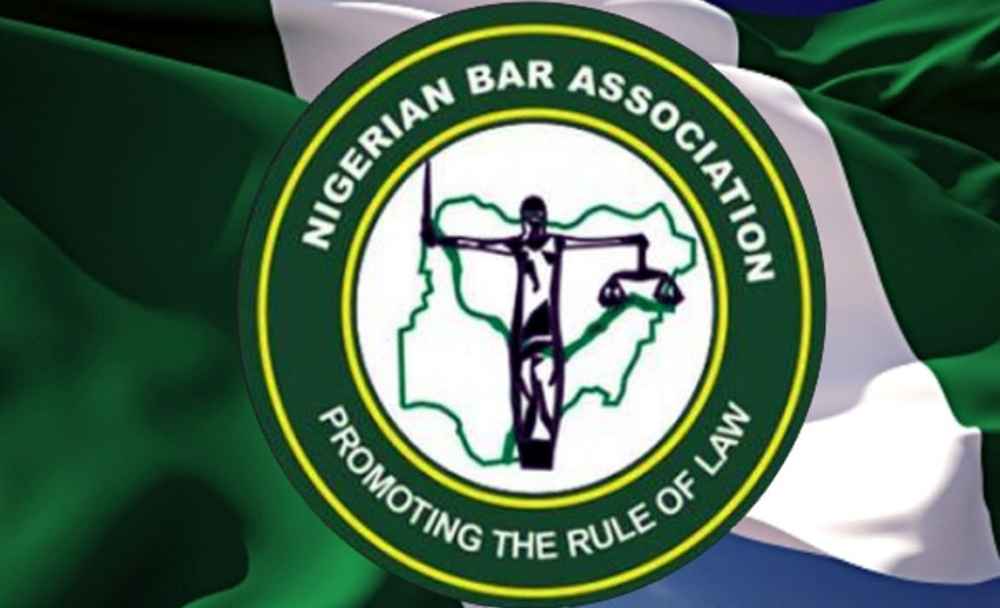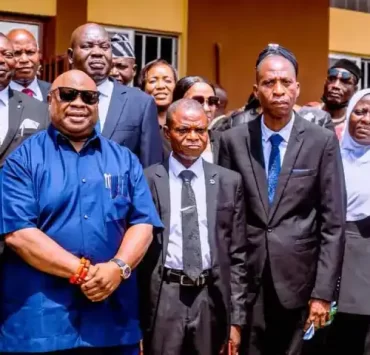NBA Petitioned over Provisions of Finance Acts, 2021, 2022

Lawyard is a legal media and services platform that provides…
A member, Taxation Standards and Practice Monitoring Committee of the Chartered Institute of Taxation of Nigeria, (CITN), Francis Uzoma Ubani, has petitioned the Nigerian Bar Association (NBA) over some provisions of Finance Acts, 2021, 2022.A statement made available to newsmen said an acknowledged copy of the petition has been made available to journalists in which Ubani called on the NBA to rise to the occasion and not give room to ‘brazen violation’ of the Constitution of Nigeria.The petition was titled:” Unconstitutionality of some of the provisions of the Finance Acts, 2021 and 2022, unlawful and illegal collection, recovery and distribution of revenue from stamp duties/electronic money transfer levy (EMTL) by the Federal Government of Nigeria, contrary to the Provision of Section 163 of the 1999 Constitution of the FRN, as altered, and the need for all Federal Government institutions, money deposit banks and individuals involved to be more transparent and obey the rule of the law on stamp duties/EMTL collection, recovery and distributions as enshrined in the relevant provisions of the 1999 Constitution of the FRN, as altered and the Stamp Duties Act, as amended.”
Ubani appealed to NBA to intervene by ensuring that the Constitution is obeyed and that the Rule of Law prevailed in this regard.
The letter reads in part: “We respectfully write you as a promoter of law reforms and legal education in Nigeria, to bring to your attention and inform you that the amendment to the sharing formula for revenue from stamp duties/electronic money transfer levy (EMTL) as enacted in the provisions of Section 23 of the Finance Act 2022, which amends Section 89A of the Stamp Duties Act, by substituting for subsection (4), a new subsection (4) as follows: – “Notwithstanding any formula that may be prescribed by any other law, the revenue accruing by virtue of the operation of this section, shall on the basis of derivation, be distributed as follow: 15 percent to the federal government and the Federal Capital Territory, (FCT) Abuja; 50 percent to the State Governments; and 35 percent to the Local Governments.
This is clearly inconsistent with the provisions of Section 163 of the Constitution of the Federal Republic of Nigeria, 1999, as altered and therefore should be null, void and of no effect whatsoever, since the distribution of the Stamp Duties/Electronic Money Transfer Levy (EMTL) revenue is based on DERIVATION, pursuant to the provisions of the Section 163 of the said Constitution and should not be shared through “the Federation Account”, without Constitutional amendment.
“We hereby call on you and respectfully urge you to stand up and take “Official Position” in this very important constitutional issue for the development of law in Nigeria and thereby advance the principle of rule of law and the supremacy of law in Nigeria, for the common good of all citizens, as Nigeria itself, is a creation of law. Rule of law means that the country is governed by civil law or regular law, that is, laws which are reasonably justifiable in a democratic society, as opposed to draconian, oppressive and arbitrary laws or arbitrary exercise of powers by the government. It is a rule of right and not of might. Therefore, rule of law and not of men, implies that decisions should be made by the application of known principles of civil laws; and without the uncertainty of discretion, force or arbitrariness in their application.
“It is in fact, very clear that the provisions of Section 163 of the Constitution under reference, that Capital Gains Tax and Stamp Duties are supposed to be paid, when applicable to the States from which they are derived and not for the benefit, inter alia, of ALL the States, which will be the case were the tax and duties are to be paid into the Federation Account pursuant to Section 162 subsection (3) of the Constitution.
“It is our contention that all policies, actions and things in the society whether they are done by an individual or government, should be done in accordance with the law and governed by the law. Therefore, the applicable procedure should be observed. When the law is not observed and people breach it here and there, dislocations and problems will occur, and the victims (the federating States of the Federation) will suffer injustice and dissatisfaction in society. Therefore, persons and governments should always obey the rule of law at all times, to avoid anarchy in the society.”
He remarked that the Deposit Money Banks and Financial Institutions should henceforth stop remitting qualified chargeable stamp duties/EMTL accruable to the different States pursuant to Section 4 (2) of the Stamp Duties Act, as amended, to the FIRS, instead start henceforth to remit to the relevant tax authorities in the various States as applicable.
Ubani further explained that the different States have a duty to explore and track the recovery of stamp duties/EMTL that accrue to both the federal government and the State Governments, pursuant to Section 4 (1) and 4 (2) and Section 163 (a) and (b) of the 1999 Constitution, as altered, and to recover back years of unremitted stamp duties from banks and other companies in the various sectors of the economy.
Continuing, he added: “It is obvious that the activities of the Federal Government through the FIRS, CBN and Deposit Money Banks, in the collection, remittance and distribution of stamp duties/EMTL, is shrouded with a lot to be desired, and calls to question as to the motive behind the unwholesome actions of the Federal Government, and its agencies, (FIRS) and (CBN) in this regard.
“Section 4 (1) and 4 (2) of the Stamp Duties Act, and Section 163 (a) and (b) of the 1999 Constitution, as altered, are very clear and unambiguous on Taxing Powers of the Federal and State Governments on issues of stamp duties and capital gains tax in Nigeria. Therefore, the unnecessary controversies surrounding stamp duties/EMTL are clearly caused by the lack of transparency in the collection, remittance and distribution of stamp duties/EMTL on the part of the Federal Government, and its agencies, (FIRS and CBN), on how much stamp duties/EMTL that has been generated, pursuant to Section 4 (1) and 4 (2) of the Stamp Duties Act.
“We therefore, urge all Federal Government Institutions, Deposit Money Banks and individuals involved, to be more transparent, observe and obey the Rule of Law on stamp duties/EMTL, collection, recovery and distribution, as enshrined in the relevant provisions of the 1999 Nigeria Constitution, as altered, and Stamp Duties Act, 2004, as amended, as when injustice becomes law, resistance becomes a duty
“In the light of the very clear provisions of the 1999 Constitution of the Federal Republic of Nigeria, and the Stamp Duties Act, it is obvious that the Federal Government, through the FIRS has no “Constitutional Right” to demand and collect stamp duties, pursuant to Section 4 (2) of the Stamp Duties Act, that are not provided for them by the Constitution to collect. I believe that we have been able to set the record straight and hereby enjoin the Federal Government, through the FIRS to desist from further usurping the powers of the different federating States of the Federation forthwith.
In conclusion therefore, the continuous sharing through Federation Account of stamp duties/EMTL in total violation of the provisions of Section 163 of the 1999 Constitution, without the proper amendment of the relevant provisions of the said Constitution, is a huge slap on the sensibility of members of the Nigerian Bar Association, and the Legal Profession in Nigeria, and therefore should stop forthwith, through your official intervention on this very all-important Constitutional and purely Legal issue. The “Legal Profession” in Nigeria is a noble profession that should not give room to brazen violation of the Constitution of Nigeria.”
Lawyard is a legal media and services platform that provides enlightenment and access to legal services to members of the public (individuals and businesses) while also availing lawyers of needed information on new trends and resources in various areas of practice.













